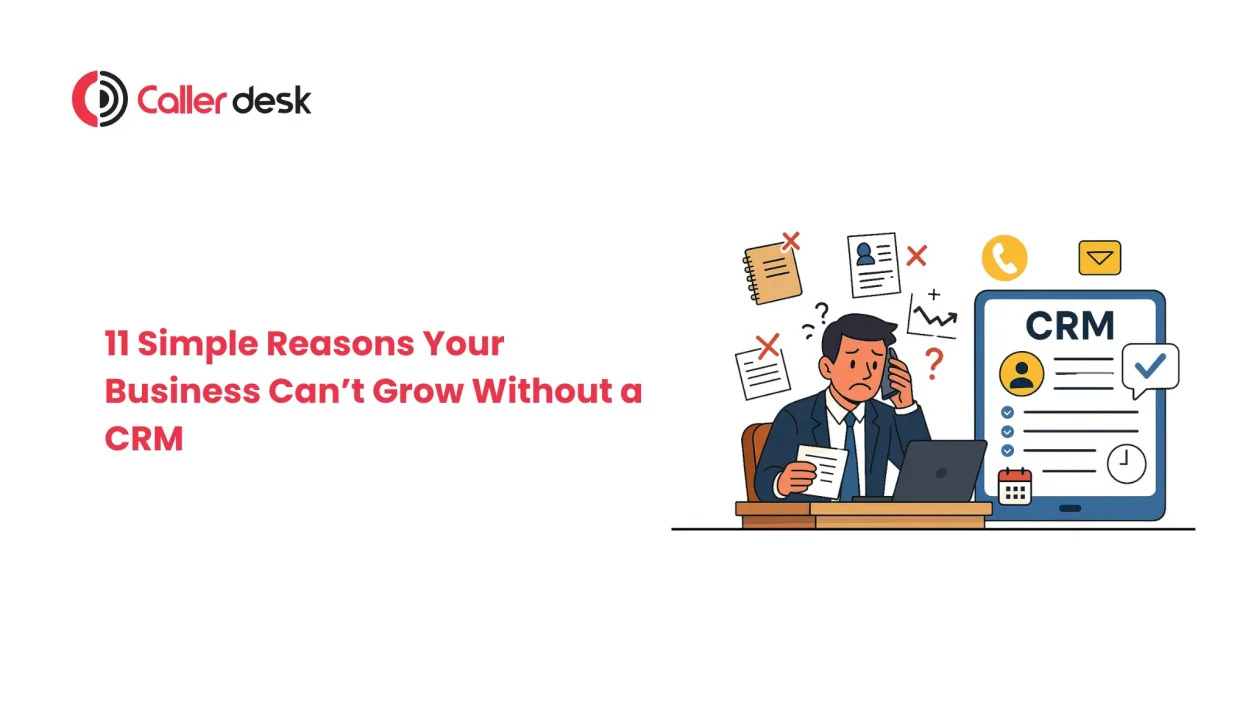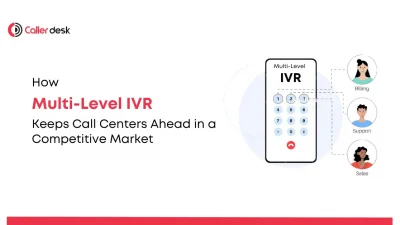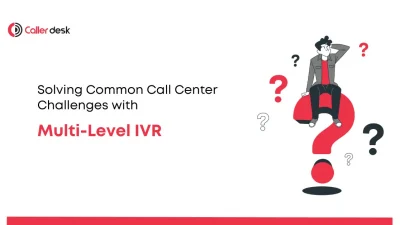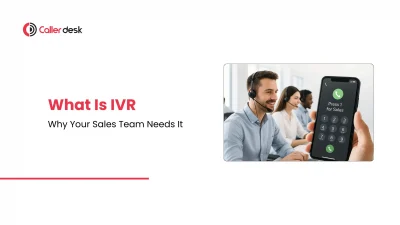Let’s be honest. Managing customers is not easy—especially when your business starts growing.
At first, you might use a simple notebook, Excel sheet, or Google Doc to track your leads and follow-ups. That works for a while. But then:
- You forget when you last spoke to a customer
- Your team calls the same lead twice
- A hot lead slips away because no one followed up
- You don’t know which salesperson is doing what
- You have no idea why sales are going down
If this sounds like your current situation, then yes—you need a CRM system.
A CRM (Customer Relationship Management) is a simple tool that helps you store customer information, track calls and emails, set reminders, and improve your team’s performance—all in one place.
Whether you run a small business or a fast-growing team, a CRM helps you stay organized, save time, and close more deals.
In this blog, you’ll learn:
- What a CRM system is
- How a CRM improves your sales and support
- 11 clear reasons why your business should use a CRM
- How to choose the right CRM for your team
Let’s get started.
What is a CRM System?
CRM stands for Customer Relationship Management. It’s a tool that helps businesses store, manage, and use customer information in one place.
Here’s how it works:
- You get phone calls, messages, and emails from many customers.
- Each customer has different details—name, phone number, what they asked about, when they last called, and what product they’re interested in.
- Instead of writing all this in notebooks, Excel sheets, or scattered emails, a CRM keeps everything together in one system.
Think of it like this:
Imagine your team has a digital diary that updates itself.
Whenever a customer calls or sends a message, the CRM saves it.
Now, when anyone from your team talks to that customer again, they can quickly check everything—what they said last time, what they need, and how to help them better.
No confusion. No missed details.
Just faster, smarter work.
That’s the power of a CRM system. It’s like having a sharp memory for your whole team—even on the busiest days.
Why is a CRM Important for Your Business?
1. You Can Track Every Lead and Customer
When a new person shows interest in your product or service, you don’t want to forget about them.
A CRM helps you save every contact, their phone number, email, and even what they talked about with your team—so you never lose track.
2. It Saves You a Lot of Time
Do your team members waste time writing down calls or sending the same email again and again?
A CRM can do these boring tasks for you automatically. This means your team gets more time to talk to customers and close deals.
3. It Shows You What’s Working (And What’s Not)
Some sales methods work better than others.
With a CRM, you can see which messages or campaigns bring in more customers.
This helps you stop doing what’s not working and focus on what brings results.
4. It Makes Customer Service Faster and Better
A customer calls with a question. Your team checks the CRM and sees the full history—what the customer bought, what they asked before, and how your team helped earlier.
This way, your team solves the problem quickly and keeps the customer happy.
5. It Helps You Make Smarter Business Decisions
Want to know how many leads you got this month? Or how many calls your team made?
CRM gives you ready-made reports that show you everything clearly.
You don’t have to guess. You can plan better and grow faster.
11 Simple Reasons Why You Need a CRM System
Still thinking about whether you need a CRM for your business?
Let’s make it easy. Here are 11 simple and clear reasons to say yes.
1. You Can Save All Customer Details in One Place
You don’t have to search emails, notebooks, or Excel files.
A CRM stores all customer information—like name, phone number, emails, and notes—in one place.
Anyone in your team can find it fast.
2. You Stay Organized and Save Time
A CRM helps your team work better.
It can do small jobs like saving calls or sending emails automatically.
This saves time and helps your team focus on selling.
3. You Remember to Call or Message Leads
It’s easy to forget things when you’re busy.
With a CRM, you can set reminders.
So you never forget to follow up with customers.
4. You Know What is Working
A CRM gives you simple reports.
You can see which emails bring more customers, how many calls were made, and how many sales were closed.
This helps you improve your work.
5. You Can Check What Your Team is Doing
You can see how many leads your sales team is talking to.
You’ll know who is doing well and who needs help.
It keeps everyone on the right track.
6. You Can Save Time on Repeating Tasks
Some tasks are repeated every day—like sending welcome emails.
A CRM can do these jobs for you.
This way, your team can spend more time talking to customers.
7. You Can Help Customers Better
When a customer has a problem, your support team can see their full history in the CRM—what they bought, when they called before, and what the issue was.
This helps solve problems faster and keeps customers happy.
8. Your Marketing and Sales Teams Work Together
Your marketing team runs ads and your sales team talks to leads.
A CRM connects both teams.
Now, sales reps can see which ad the lead clicked and talk to them better.
9. You Build Easy Steps to Close Sales
A workflow is a step-by-step plan to handle leads.
With a CRM, you can build a clear plan—like when to call, what to send, and when to close.
This helps in closing more deals.
10. You Get Quick Reports Anytime
Want to know how many sales were made this week?
A CRM gives real-time reports in just one click.
No need to wait for anyone.
11. You Can Grow Your Business Faster
A CRM helps you manage more customers without confusion.
It keeps everything clean, simple, and clear.
Studies say if you spend ₹1 on a CRM, you can earn ₹8 or more in return.
That’s a great deal!
How to Choose the Right CRM (Even If You’re Just Starting Out)
Picking a CRM can feel confusing—but it doesn’t have to be.
You only need to answer three simple questions to make the right choice.
Let’s make it easy for you.
1. What Do You Want to Achieve?
Ask yourself:
Why do I need a CRM?
Your goal could be:
- Getting more leads
- Following up faster
- Tracking your team’s performance
- Improving customer service
When you know what you want, you can skip CRMs that offer too much or too little.
Example: If you just want better lead follow-ups, there’s no need to pay for advanced marketing tools you won’t use.
2. What Features Will Actually Help You?
Next, think about what you do every day.
What tools would make your job easier?
Do you need:
- Call tracking and reminders?
- WhatsApp or SMS integration?
- Email automation?
- A simple dashboard to see reports?
Make a short list of features that will actually save you time and effort.
Start with what’s important today. You can always add more features as your business grows.
3. What’s Your Budget?
Now ask: How much can I spend?
If you’re a small team or just starting out, a free or low-cost CRM might be enough.
If you’re growing fast or have a bigger team, it’s smart to invest in a powerful tool that can scale with you.
A good CRM pays for itself by helping you close more deals and manage customers better.
Conclusion
As your business grows, managing leads and customers gets harder. You might forget follow-ups, lose important details, or miss chances to close deals. That’s where a CRM system helps.
A CRM keeps all your customer data in one place, sets reminders, tracks calls, and gives reports—so your team stays organized, follows up on time, and improves sales.
But just having a CRM isn’t enough.
To get the most out of it, your communication tools—like calls and messages—should connect with your CRM. That’s where CallerDesk comes in.
CallerDesk works with CRMs like Zoho, HubSpot, and LeadSquared to sync your calls, follow-ups, and reports. This saves time, avoids mistakes, and helps your team close more deals.
So if you want to grow without confusion:
Choose a good CRM. Connect it with CallerDesk. And build a smarter, faster business.





